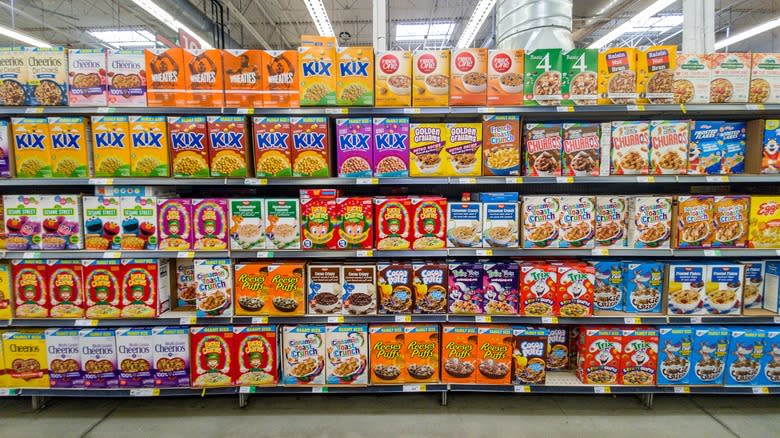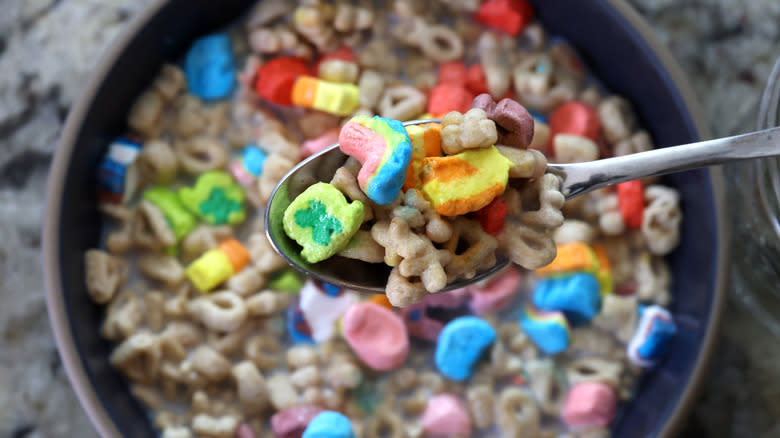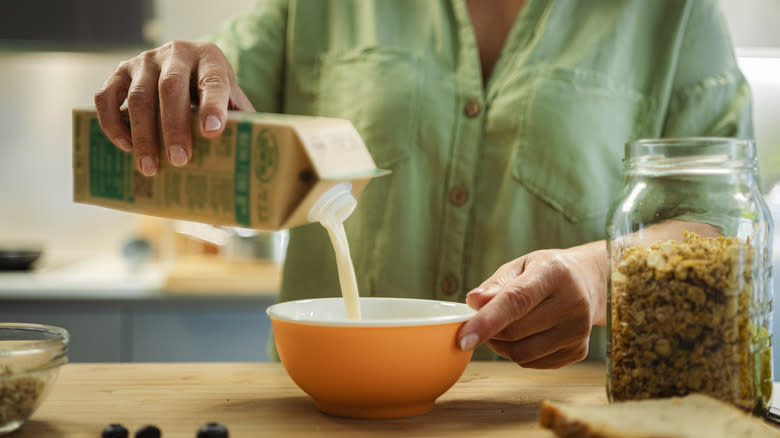Generic Vs Brand Name Cereal: Should You Save Or Splurge?

Dupe culture continues to grow in popularity as consumers share their favorite knockoff products that resemble recognizable name-brand products for a fraction of the price. With rising costs of groceries and essential goods due to inflation and labor shortages, it's no surprise that dupe culture has made its way into the grocery aisles. Now more than ever, shoppers are searching for ways to save money without sacrificing the quality of their food. One of the pantry staples that most consistently provides shoppers with generic brand alternatives is breakfast cereal -- but does the more expensive name brand actually taste any better?
Many of the most popular breakfast cereals on shelves today have generic brand alternatives that go head-to-head with General Mills and Kellogg classics. Large grocers such as Aldi, Trader Joe's, Walmart, and Target all have their own takes on easily recognizable cereals like Cheerios and Fruit Loops, not even attempting to hide their similarities with names like Fruit Rings and Honey Nut O's. Generic brand cereals may look like a silly knockoff of childhood favorites you know and love, but don't count them out just yet. For many cereals, the name brand and generic brands look and taste virtually the same, with the only difference being what name and cartoon character are on the outer packaging.
Read more: 14 Of The Oldest Cereals Still On Shelves
Not All Name Brand Cereals Are Worth The Extra Cash

Cereal boxes are home to some of the most iconic food mascots of all time, but according to experts, name brands are getting away with hiking up prices because of the recognizable faces of Tony the Tiger or Lucky the Leprechaun. Consumer Reports editor Amanda Walker told ABC News that perceived popularity is one of the only differences between generic cereals and name brands you know and love. "Brands are more expensive because they have higher marketing costs and advertising costs. And they may even be paying for better positioning in the stores."
When browsing the cereal aisle at your local grocery store, you'll notice that name-brand cereals cost significantly more than the so-called knockoff brand that provides the same type and amount of cereal merely because of the noticeable packaging difference. For seasoned cereal eaters looking to save a few dollars on their weekly shopping trip, consider opting for the generic brand of your favorite cereal. As much as you may enjoy looking at Snap, Crackle, and Pop while eating a bowl of Rice Krispies, you'll more likely enjoy a few dollars in savings. And when it comes to taste, some have found that most generic brand cereals taste the same as their name-brand counterparts, if not better.
These Generic Brands Are Beloved By Cereal Fans

More often than not, people prefer the name brand item over generic brands simply because of brand recognition rather than the actual flavor or quality. A Reddit user in the r/Frugal thread shared that many generic cereals are the "exact same product as the name brand, just in off-hand packaging."
Another user who works in packaging confirmed that they have witnessed the same product dispensed into name-brand and generic packaging for labels like Great Value, Aldi, Trader Joe's, and Whole365. People in the comments also shared that the Kroger and Publix versions of Honey Nut Cheerios are far superior to the name brand in flavor and price. Another user shared that they prefer the Wal-Mart version of Fruity Pebbles and Lucky Charms, claiming it comes in a much larger bag and no one can tell the difference, flavor-wise.
Generic cereals seem to be pretty similar across the board, but tastes are all in the eye of the beholder. Price comparison and taste differences between name- and off-brand cereals are factors to consider when choosing which type to place in your shopping cart.
Read the original article on Daily Meal.

